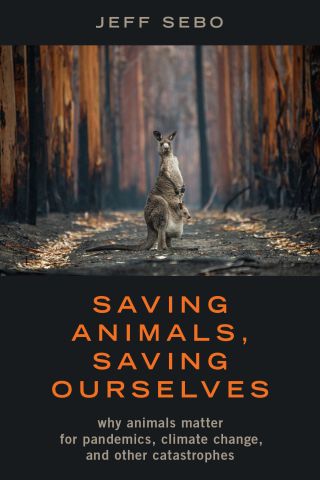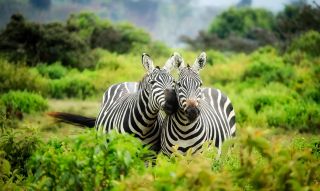Environment
Saving Animals, Saving Ourselves: What Harms Them Harms Us
Jeff Sebo's wide-ranging book is a must-read for a broad global audience.
Posted January 16, 2023 Reviewed by Ekua Hagan
Key points
- Using research from many disciplines, Jeff Sebo argues that humans have a responsibility to harm animals less.
- In a world reshaped by human activity, leaving wild animals alone is no longer an option, as everyone and everything are deeply interconnected.
- To develop ethical and effective policies, humans, animals, and the environment need to be considered holistically.
Every now and again, a book comes along that forces me to go from one- or two-dimensional thinking into multi-dimensional spaces in which a wide variety of seemingly unrelated topics and variables come together into a unified, or relatively unified, whole. NYU professor Jeff Sebo's book, Saving Animals, Saving Ourselves: Why Animals Matter for Pandemics, Climate Change, and other Catastrophes is one of those eclectic works that asks us step out of our comfort zones and consider how, for example, our treatment of nonhuman animals (animals) has wide-ranging global effects that trespass in numerous areas, some of which are included in his subtitle.

In his wide-ranging and forward-looking book, Jeff very effectively argues that "humans have a moral responsibility to include animals in global health and environmental policy." In all honesty, reading Saving Animals, Saving Ourselves made me once again come to the realization that if we all don't work together, no one, perhaps especially future generations of humans and nonhumans whose lives we are seriously compromising, will get out of here alive.1,2
I'm pleased Jeff could answer a few questions about how saving animals will help us save ourselves and our fascinating, magnificent, and troubled planet.
Marc Bekoff: Why did you write Saving Animals, Saving Ourselves?
Jeff Sebo: Industries like factory farming, deforestation, and the wildlife trade kill billions of animals per year, and they also contribute to pandemics, climate change, and other global threats that imperil humans and nonhumans alike. To address these harms, humans need to reduce our use of animals and increase our support for them at the same time. I wrote this book to call for research and policy that can make progress towards these goals.
MB: How does your book relate to your background and general areas of interest?
JS: My background is in philosophy, and my current work is in animal studies and environmental studies. This book is likewise rooted in philosophy but ultimately multidisciplinary. I argue that humans have a responsibility to harm animals less and help them more, and I discuss a wide range of questions in the humanities, social sciences, natural sciences, and law and policy that we need to ask in order to do that work ethically and effectively as well.
MB: Who is your intended audience?
JS: I wrote this book for academics, advocates, policymakers, and anyone else. The book argues that we need more research and policy that links animal welfare, global health, and the environment, and it proposes steps that individuals, companies, and governments can take to make progress towards this goal. So, I hope that the book can motivate people to participate in this work, and that it can give them ideas about how to start.
MB: What are some of your main topics and messages in the book?
JS: The book argues that humans should harm other animals less, for instance by ending factory farming, deforestation, and the wildlife trade, and that we should also help them more, for instance by including animal welfare in impact assessments and policy decisions regarding education, employment, social services, infrastructure, and much more. Along the way, I discuss several other related themes as well. For example:
The Anthropocene blurs the distinction between natural and human-caused harms. Many people assume that we should leave wild animals alone. But in a world reshaped by human activity, leaving wild animals alone is no longer an option. Human activity is already impacting wild animals, both directly and indirectly, whether we like it or not. The only question now is how, if at all, we can improve our impacts on wild animals.

These issues are both urgent and complex. We need to help other animals, but we also lack the ability to do this work well, due to the limits on our knowledge, power, and political will. This reality can be hard to accept, because it can be painful to acknowledge that we lack the ability to do what we need to do. As a first step towards ethical and effective action, then, we need to accept our responsibilities and our limitations in equal measure.
Every option carries risk. In our interactions with other animals, both action and inaction carry risks. When we try to help other animals more, we risk causing new harms. But when we try to help them less, we risk allowing harms that human activity is already causing to play out. To strike a balance, we should try to help some animals now in ways that can build knowledge, power, and political will towards helping more animals later on.
Progress requires holistic, structural, comprehensive change. In order to develop ethical and effective policies, we need to consider humans, animals, and the environment holistically. We need to build political, economic, and ecological structures that accommodate everyone. And we need to consider the indirect effects of our actions and policies, including the effects that human-caused environmental changes will have on other animals.
MB: How does your book differ from others that are concerned with some of the same topics?
JS: This book is broader than most books on these topics. For instance, it discusses factory farming, deforestation, the wildlife trade, animal welfare, pandemics, climate change, One Health, The Green New Deal, research, education, employment, social services, infrastructure, legal and political status, creation ethics and population ethics, and more. The aim is to show why all these topics matter and how they relate to each other.
MB: Are you hopeful that as humans learn more about the numerous reasons why other animals matter, humans will treat other animals and their homes with more respect and dignity?
JS: Yes, I think that we can make progress, and that learning about why animals matter is part of what we need to do. Individual and structural change are linked. We need to change individual hearts and minds to build support for structural legal, political, economic, and ecological changes. But we also need to make those structural changes to make it easier for individuals to make respectful, compassionate choices in their own lives.
References
In conversation with Dr. Jeff Sebo, Clinical Associate Professor of Environmental Studies, Affiliated Professor of Bioethics, Medical Ethics, and Philosophy, and Director of the Animal Studies M.A. Program at New York University.
1) I realize this is similar to the title of the biography of renowned rock singer Jim Morrison's, No One Here Gets Out Alive.
2) A few months, ago a 10-year-old girl pointedly asked me, "Why are you destroying our future?" I really didn't have a good answer.
One Health Stresses Working Together to Heal a Broken Planet.
Veterinarians Can Help Promote Animal and Human Well-being.
One Welfare: Ways to Improve Animal and Human Well-Being.
Why People Should Care About Animal and Human Suffering.
Homo Ecophagus: A Species Who Devours Global Ecosystems.
Sample, Ian. Altruism towards other species may have helped humans thrive, study finds. The Guardian, January 16, 2023.




